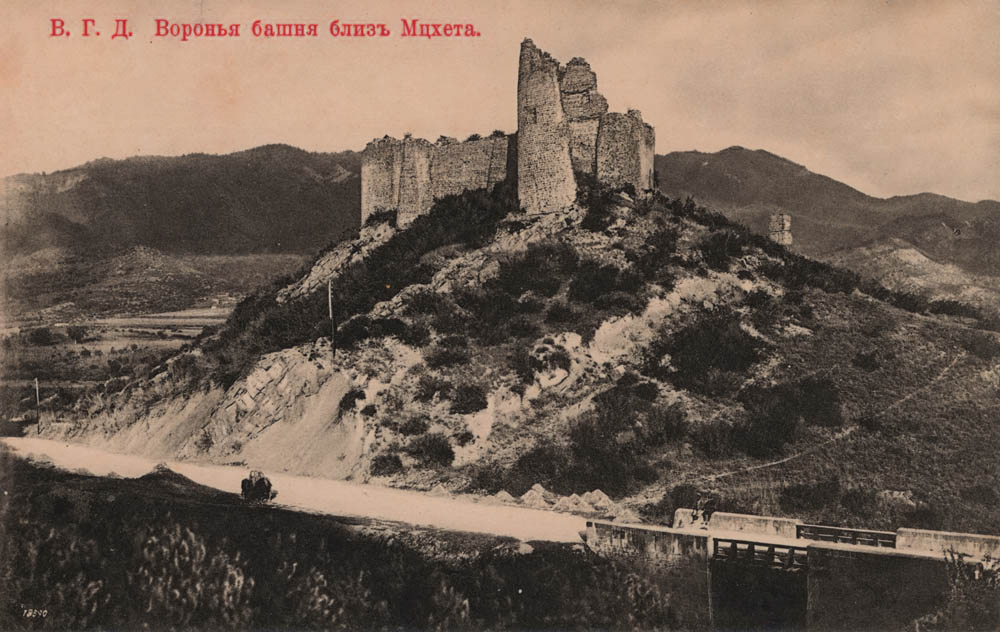Long ago Duke Simon ruled over these lands. Revered among his subjects, he constructed a guard tower to protect his subjects from raiders. The duke was cherished by his servants and the peasants that lived on his extensive lands, his equals and his subjects.
But it was the beatiful Makrina, Simon’s daughter, who cherished the duke the most.
The Duke also had a son, Mamuka. Alas, the Creator did not gift him with his father’s courage or kindness: if he found a chick, he would nail it to a tree. If he came upon a cat or dog, he would stone it to death. At any opportunity he would enact some wickedness against the weak.
Makrina too, endured much suffering at Mamuka’s hands. She concealed from her father the bruises from the beatings, but Simon still perceived his son’s evil proclivities. The elderly duke was distraught, but, unwilling to take stricter measures, was unable to expunge the wickedness. The duke lived a long and virtous life, but at last the Lord called for Simon’s spirit. The entire vicinity wept, but Makrina was saddened the most.
Friends and comrades arrived from across the land. Nobles gave flowery speeches in praise of Simon’s merits and wit, while the youths listened respectfully to their kin, asking the merciful Lord for similar acclaim after their passing. After a three-day funeral feast the guests departed, leaving an inconsolable Makrina and a gloomy Mamuka alone in the joyless house.
Everything changed in that dwelling, which was a shelter for the wretched and a welcome abode to the neighbour. The servants became weary of fulfiling their master’s whims. The people suffered as well: Mamuka raised the galla (a bread tax) and the sabalaho (a fee for animal feed and harvesting). He tormented and mocked his subjects, but his own defenceless sister suffered the most.
Makrina, hearing the groans the of people, tearfully beseeched her brother to calm his proud heart. She did so without reproach, but Mamuka knew nothing worse than his sister’s pleas. So he threatened to lock her in the Aragvi tower, and starve her to death.
Makrina’s young heart knew no fear. The duchess, armed with her faith in God, once more entreated her brother to stop beggaring the peasants, and to be gentler to their servants. Boundless fury consumed Maamuka, and he imprisioned his sister in the guard tower. The sentries he ordered below, to unceasingly watch over Makrina.
The enemy found out that the guard tower was now a prison, and that none raise the alarm during a raid. Thus they began to drive cattle to the mountains. In the meantime, Makrina prayed feverently to God, so that He may pacify her brother’s heart and thus ease the suffering of those under his yoke. And the Lord quickly heeded her virtuous prayer.
Maumuka gathered his men to toil, not allowing them to leave even for a meal – nearby there were cauldrons in which cooked meager food. The duchess ascended to the top of the tower, and caught sight of the weary men trudging to the cauldrons for their food, and the ravens that circled above the cauldrons. The ravens fell into the cauldrons, and the men became disgusted as the foul birds boiled with their food. So they emptied the cauldrons’ contents onto the ground.
“What are you doing!” exclaimed the duke. Before he finished, snakes crawled out of the cauldrons and entangled the fiend. The man repented his sins, and Makrina too prayed to the Lord, promising to spend the remainder of her days in a monastery. And a miracle occurred: the snakes fell to the ground like dry twigs, and the ravens flew away to the mountains. At the same time, a white dove soared into the heavens. The people said that it was Simon’s spirit.
Mamuka freed his people, and gave his goods to the beggared peasants. But his soul was not appeased. Thus he erected a temple for the glory of the Lord and the miracle He wrought. Then, clad in a beggar’s garb, Mamuka left for distant lands.
Many years passed. Not a single eyewitness of Mamuka’s repentance was left alive; his story turned into a legend. At the end of the seventieth year, Makrina recieved her last rites in Mtskheta’s cathedral. Present during the ceremony was an unknown ancient.
Calmly and with great dignity, he approached the deceased, reverently knelt, and said: “Dear, sister, you and I have fulfiled our vows.” As soon as the ancient spoke, his spirit calmly united with his sister’s soul.
And everyone realised that the ancient was none other than Mamuka, and buried him beside his father and sister. The people said that on the night of the siblings’ death the green grass and thick crowns of trees whispered sweetly and sonorously around the ancestral church, and in the morning flowers unknown in these parts bloomed.
